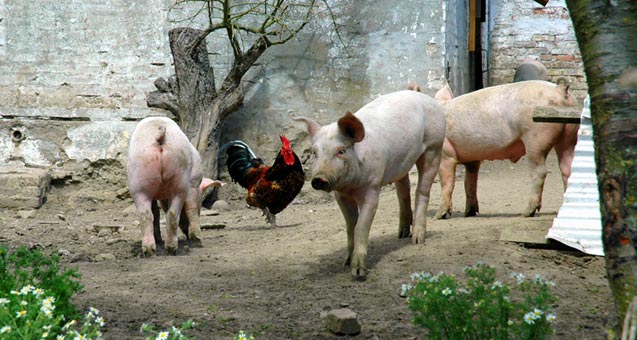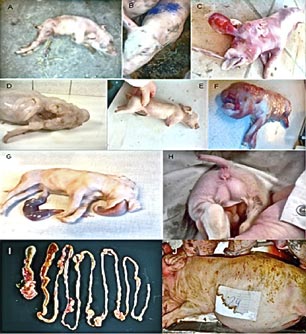
One little piglet was born with only one large eye. A second piglet was missing an ear. A third piglet had a large hole in its skull. A fourth piglet had a monstrously huge “elephant tongue.” A female piglet was born with testes. Still others had malformed limbs, spines, skulls and gastrointestinal tracts.
The pigs in question belonged to a Danish pig farmer. For three years he had fed his pigs ordinary, non-genetically modified soy. When he ran out, he bought the cheaper genetically modified (GM) soy pig feed. His herdsman, unaware of the feed switch, immediately noticed that the pigs lost their appetite and that the piglets developed diarrhea. Even worse was the sudden and shocking increase in birth defects. The farmer, eager to understand the cause, had 38 of the deformed pigs euthanized and tested for glyphosate, the herbicide used on the GM soy. The results were published in the April 2014 issue of the Journal of Environmental and Analytic Toxicology. The samples of lung, liver, kidney, brain, gut wall, heart and muscle all tested positive.
Glyphosate is the world’s most frequently used herbicide. First marketed by Monsanto in the 1970s under the trade-name “Roundup,” it is used extensively wherever GM crops are grown. Monsanto has touted Roundup’s safety, claiming that, since it attacks an enzyme system not present in animals, it is harmless to people and to pets. We are beginning to find out that this is simply not true. As scientists start to investigate the effects of glyphosate residues in humans and animals, a horrifying story is beginning to emerge. It begins with what we have learned about glyphosate’s propensity to cause birth defects.
Glyphosate and Birth Defects
Glyphosate is a known teratogen, meaning “monster-maker.” Studies conducted on rats and rabbits since the 1980s have shown an astonishing spectrum of birth defects associated with glyphosate, including absent kidneys, missing lobes of the lungs, enlarged hearts, ventricular septal defects (holes in the heart), extra ribs, and deformed and absent bones of the skull, spine, ribs, sternum and limbs.
But if birth defects in rats and rabbits have not been enough to get our attention, we are now seeing high rates of spontaneous abortion and birth defects in human infants born in areas where glyphosate is being sprayed. This is particularly true in Argentina, Paraguay and other parts of Latin America where GM acreage has increased significantly. A group of researchers in Argentina noted alarmingly high rates of miscarriages and birth defects in families living within meters of glyphosate spraying. They decided to conduct a study with animals in the laboratory.
The scientists exposed frog and chicken embryos to glyphosate. The herbicide caused birth defects in the embryos similar to those seen in human infants. They were able to demonstrate that glyphosate attacks the Vitamin A (retinoic acid) signaling pathway, which is crucial for normal fetal development in vertebrates. Since the Vitamin A pathway is found in all vertebrates, it is likely that the piglet birth defects, too, can be explained by a glyphosate induced disturbance of this pathway during embryonic development.
But, there’s more.
Glyphosate’s Role in Chronic Diseases
The Vitamin A pathway is part of a much larger enzyme system known as Cytochrome P450. This enzyme system is present in most tissues of our bodies. It plays critical roles in estrogen and testosterone synthesis and metabolism, as well as in cholesterol synthesis, and in Vitamin D metabolism. Cytochrome P450 enzymes also function to inactivate potentially toxic compounds. Most drugs are metabolized by this enzyme system. It has now been demonstrated that glyphosate interferes with several of the enzymes in this vital system.
One of the enzymes that glyphosate inhibits is called “aromatase.” It converts testosterone to estrogen. Glyphosate’s interference with this particular enzyme may explain its association with impaired fertility.
In addition, glyphosate is toxic to many of our gut bacteria. These bacteria are vital to human health. Gut bacteria aid digestion, synthesize vitamins, detoxify foreign chemical substances, aid immunity and help the gastrointestinal tract to maintain normal permeability. When glyphosate kills off certain of our helpful gut bacteria, other bacteria grow, and those other bacteria may be harmful. The loss of the protective bacteria may make us vulnerable to leaky gut syndrome, ulcerative colitis and other gastrointestinal maladies.
But that’s not all. The glyphosate induced change in the bacterial flora can also lead to the overproduction of ammonia, and to a deficiency in essential amino acids and in necessary metals, like zinc and sulfur. Elevated ammonia levels are seen in children with autism. Sulfur deficiency has been associated not only with autism, but with Parkinson’s disease, Alzheimer’s disease and amyotrophic lateral sclerosis as well. Zinc deficiency, too, has been associated with autism and Alzheimer’s disease, and also with attention deficit and hyperactivity disorder.
The depletion of amino acids by glyphosate can result in abnormally low levels of the neurotransmitters serotonin and dopamine. Serotonin, as we know, regulates mood, appetite and sleep. Serotonin depletion may lead to depression, insomnia and disorders of appetite, like obesity and anorexia. Dopamine depletion in a key brain area is the hallmark of Parkinson’s disease.
A group of researchers from the University of Leipzig published a study in 2014 investigating the prevalence of glyphosate residues in humans and animals. They sampled urine and tissue from cows, hares and rabbits, and tested urine from humans. An interesting finding, very much in line with the association of glyphosate with a myriad of illnesses, was that chronically ill humans have significantly higher glyphosate residues in their urine when compared to healthy people.
It’s Everywhere
Despite these ominous warnings, glyphosate use continues to increase. Since 1996, when GM crops were first commercially introduced, the amount of land devoted to these crops has multiplied a hundred-fold. As more and more acreage is planted with GM crops, glyphosate use increases. Ninety percent of GM crops worldwide are engineered to be glyphosate resistant. These crops are designed to be grown with repeated and heavy spraying of glyphosate.
In addition, the ever-increasing problem of glyphosate resistant weeds has encouraged farmers to intensify glyphosate use. As a result, glyphosate now appears in groundwater, rain and air. It has been found in the urine and organs of dairy cows and rabbits. It has been found in the urine of farmers and their family members. It is in animal and human food derived from GM soy, corn and alfalfa. It is in the meat of the animals that consume these foods as well. Glyphosate residues are not removed by washing. Cooking does not break down the glyphosate. The herbicide residue can remain in food for more than a year, even if the food is processed, dried or frozen.
From Science to Public Policy
 Photos of malformed Danish piglets. A: spinal deformation, B: ear is not formed, C: cranial deformation, D: cranium hole in head, E: piglets born alive having short legs and one eye not developed, F: one large eye, an elephant trunk with bone in it, G: elephant tongue, H: female piglet with testes, I: fore gut and hind gut of the piglet with swollen belly are not connected, J: malformed piglet with swollen belly. (Photos courtesy of Professor Monika Krueger)When Ib Borup Pedersen, the Danish pig farmer, found out that his deformed and sick pigs were most likely suffering from glyphosate toxicity, he immediately called for the herbicide to be banned. He had seen up close the grotesque abnormalities that the herbicide had likely caused. The scientists who examined Pedersen’s piglets warned:
Photos of malformed Danish piglets. A: spinal deformation, B: ear is not formed, C: cranial deformation, D: cranium hole in head, E: piglets born alive having short legs and one eye not developed, F: one large eye, an elephant trunk with bone in it, G: elephant tongue, H: female piglet with testes, I: fore gut and hind gut of the piglet with swollen belly are not connected, J: malformed piglet with swollen belly. (Photos courtesy of Professor Monika Krueger)When Ib Borup Pedersen, the Danish pig farmer, found out that his deformed and sick pigs were most likely suffering from glyphosate toxicity, he immediately called for the herbicide to be banned. He had seen up close the grotesque abnormalities that the herbicide had likely caused. The scientists who examined Pedersen’s piglets warned:
The presence of glyphosate residues in both humans and animals could haul the entire population towards numerous health hazards. Studying the impact of glyphosate residues on health is warranted and the global regulations for the use of glyphosate may have to be re-evaluated.
It seems that it is indeed high time to examine our public policies around the use of this potentially deadly chemical. The US Environmental Protection Agency (EPA) is due to re-evaluate glyphosate in late 2014 and to make a final determination on its status in 2015. The science is clear. Glyphosate produces birth defects in vertebrates, including in humans. Glyphosate may be a cause of, or a trigger to, a dizzying array of chronic health problems.
Let’s join Danish pig farmer Ib Borup Pedersen and call for an immediate ban of glyphosate!
The author thanks Vivien Feyer for editorial assistance.
Matching Opportunity Extended: Please support Truthout today!
Our end-of-year fundraiser is over, but our donation matching opportunity has been extended! Today, all donations to Truthout will be matched dollar for dollar. Your one-time gift today will be matched immediately. As well, your monthly donation will be matched for the whole first year, doubling your impact.
This matching gift comes at a critical time. Trump has made it no secret that he is planning a demolition-style attack on both specific communities and democracy as a whole, beginning on his first day in office.
Help us prepare for Trump’s Day One, and have your donation matched today!